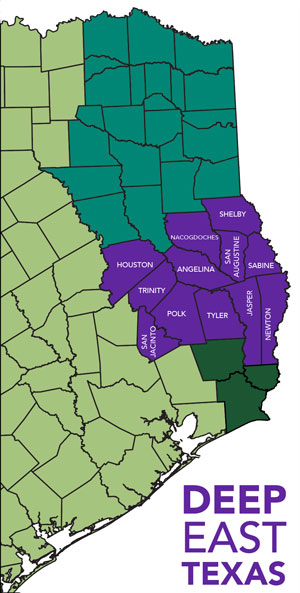The Center for Applied Research and Rural Innovation brings faculty and students together with business, industry, education and community partners in dynamic environments.
Established in 2021, the center exists to advance economic growth in our rural Deep East Texas region. Through collaboration with education, industry and community, we work together to leverage, promote and advocate activities that result in a direct impact on economic development.
CARRI is an information and resource hub for the region and SFA students, faculty and staff. The CARRI team consists of connectors and conveners who leverage university resources to address regional issues.
Our goals
The center, in concert with the work being done by colleges, universities, and public and private entities throughout our region, helps realize the vision for growth that has been developing for more than a decade by supporting these primary goals:
- Generate a creative economy and engine for vitality and growth that attracts business and industry and encourages talented individuals to stay and invest in the region.
- Create a unique innovative culture that builds on local strengths and creates a distinctive advantage for the region, including generating jobs and improving the quality of life.
- Increase the capacity of the regional workforce in key areas such as data analytics, digital media, and tech commercialization and transfer.
- Foster collaboration among higher education, business and industry, and local agencies to address issues and solve problems that no one entity can address by itself.
- Develop regional leaders in business and education who understand the challenges and opportunities of this swiftly changing environment.
Serving a 12-County Region
CARRI serves the Deep East Texas region, which covers 9,906 square miles and is comprised of the following 12 counties:

- Angelina
- Houston
- Jasper
- Nacogdoches
- Newton
- Polk
- Sabine
- San Augustine
- San Jacinto
- Shelby
- Trinity
- and Tyler.
Located south of Tyler and Longview, north of Houston and Beaumont, and adjacent to Louisiana's western border, there are no urbanized areas within the region and the entire region is rural per the U.S. Census Bureau.

 Axe ’Em, Jacks!
Axe ’Em, Jacks!